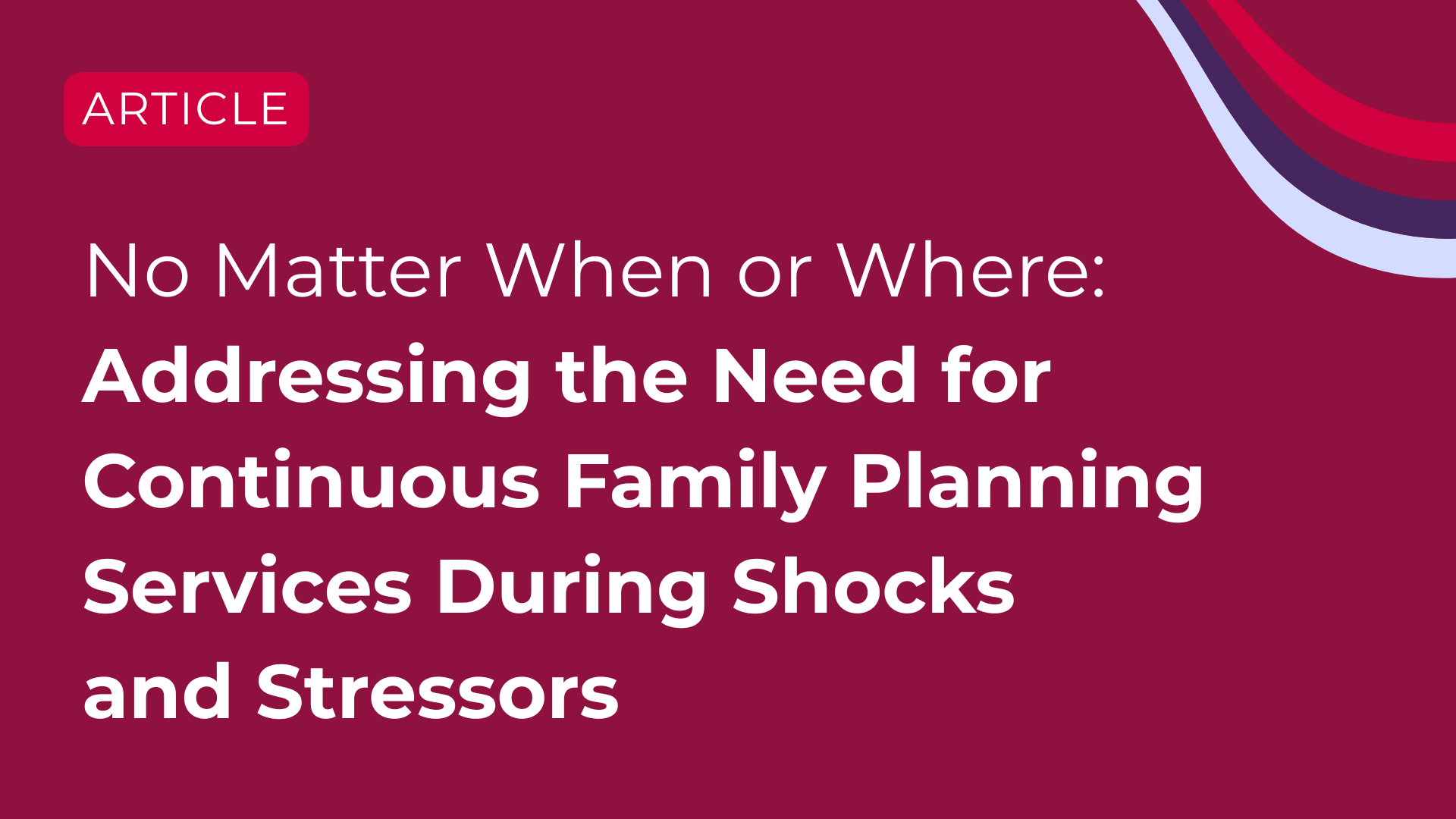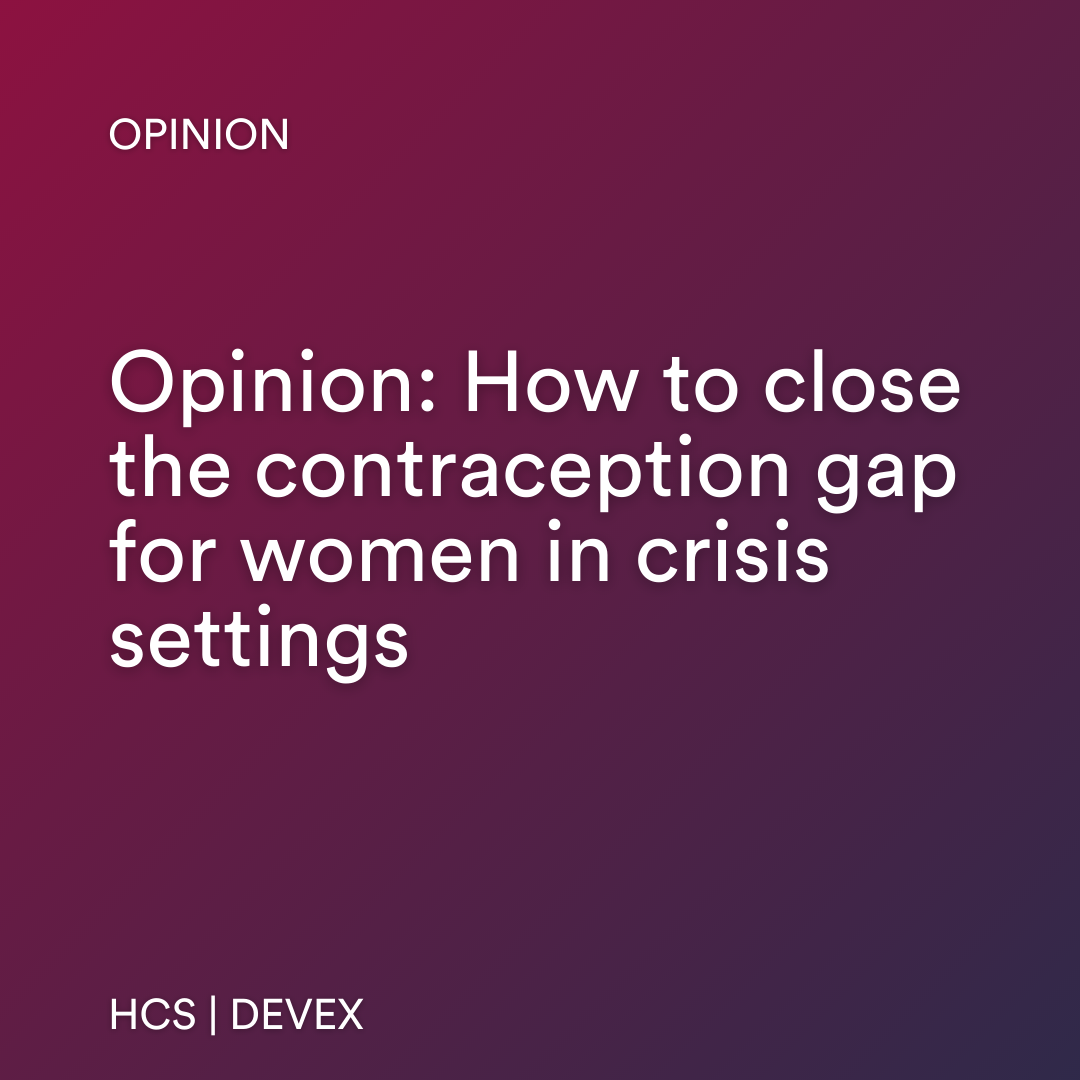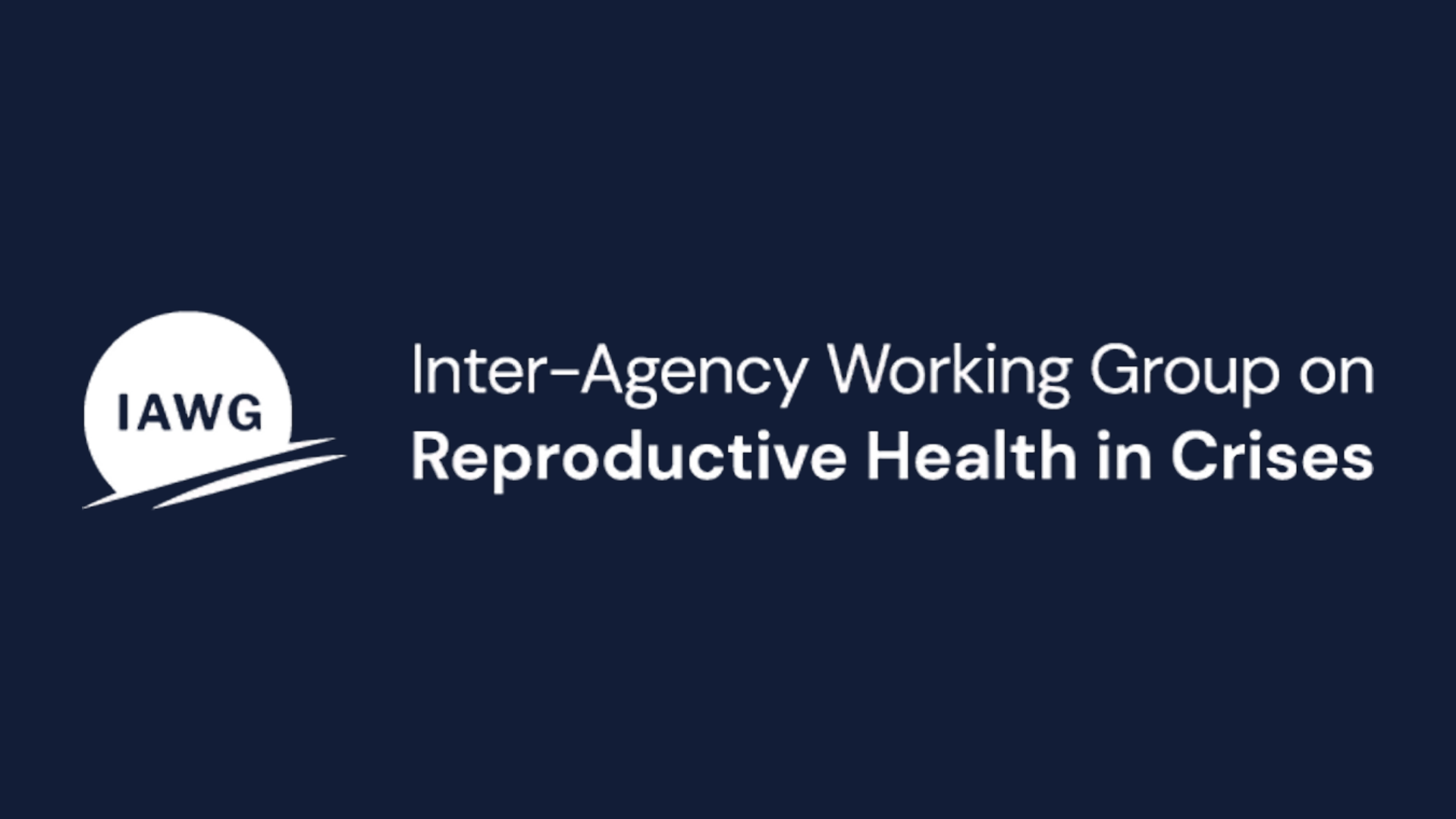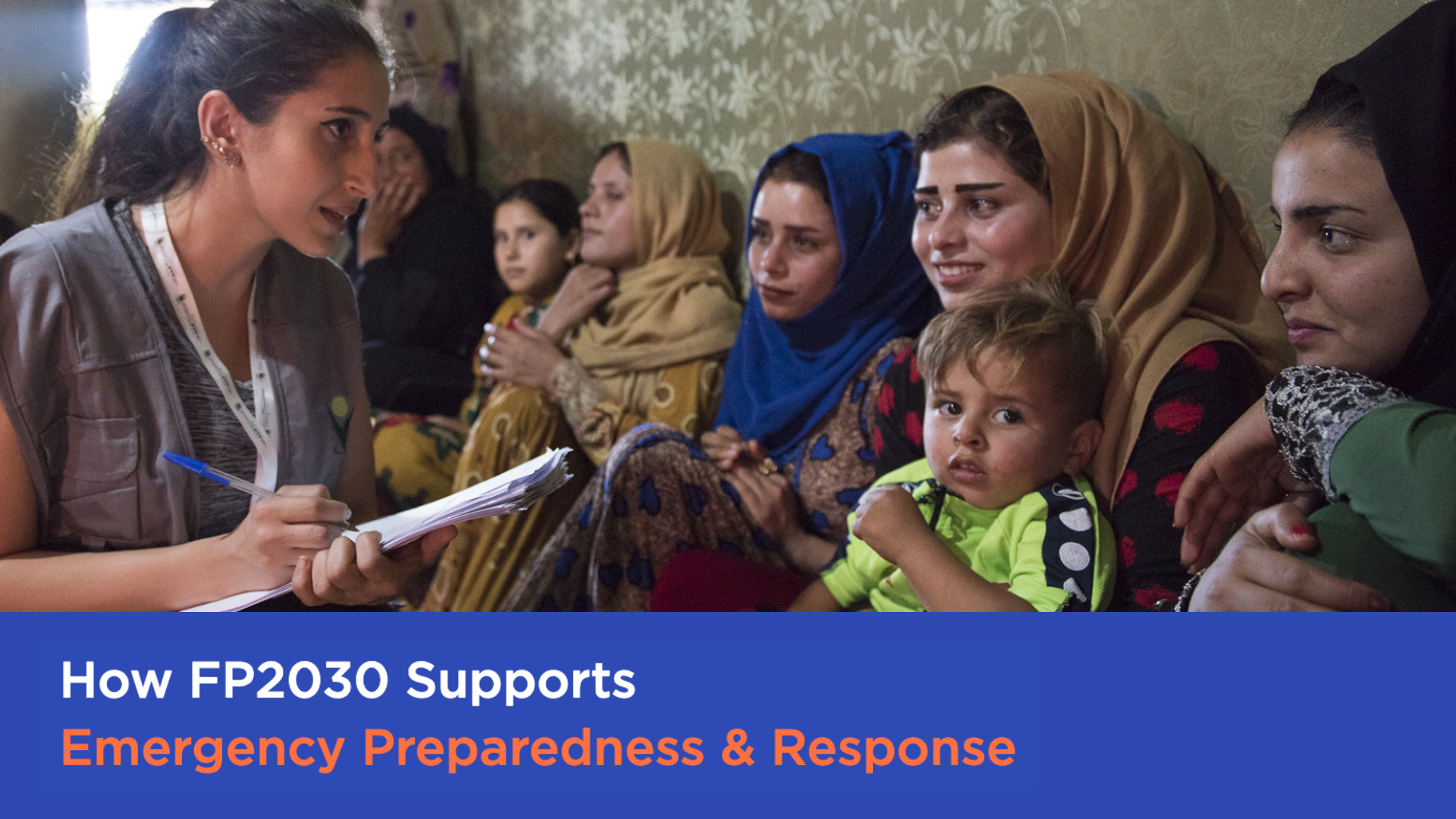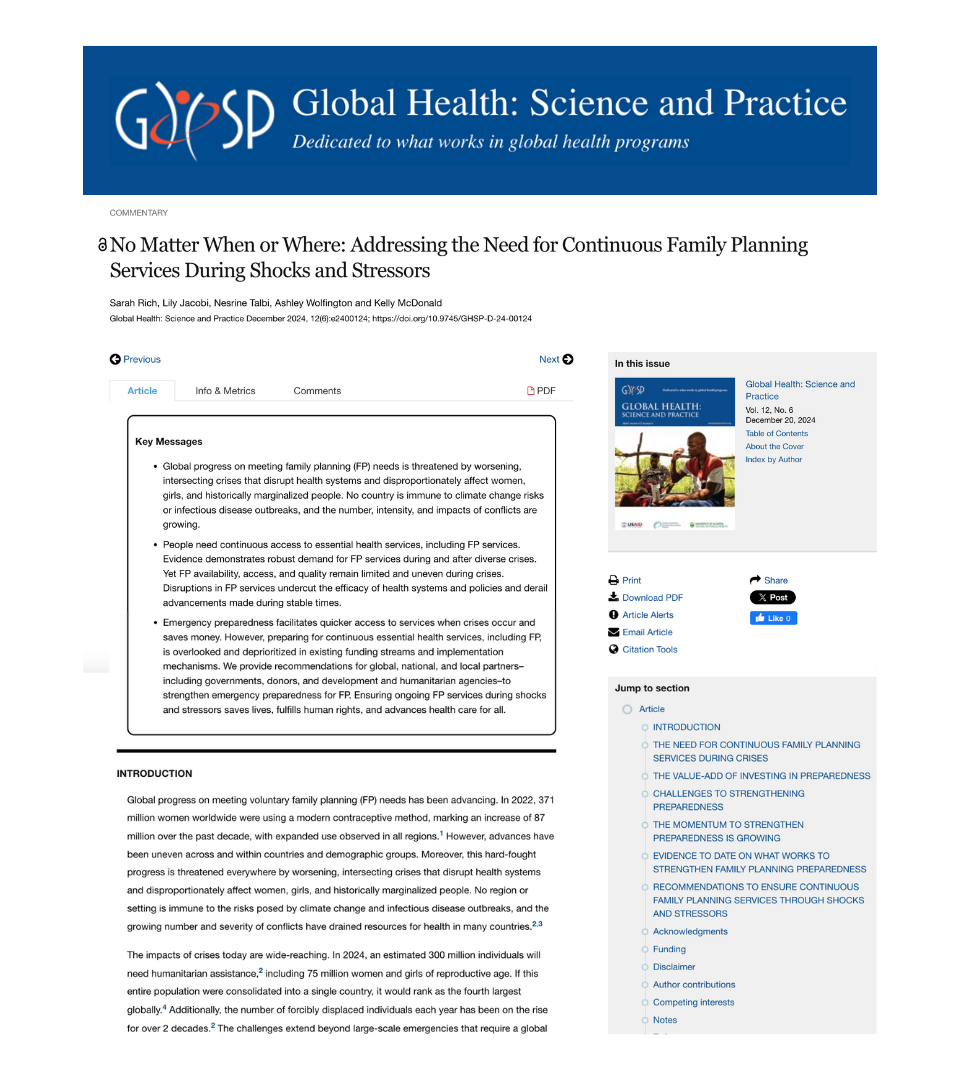ICFP Humanitarian & Crisis Settings Subcommittee
This community is dedicated to improving access to comprehensive family planning as a reproductive right from preparedness through emergency response, protracted crises, and recovery settings.
FAQ
What Do You Do?
The community aims to increase awareness among key stakeholders, including donors and other priority audiences, of the critical role of SRH during humanitarian crises and to highlight progress to accelerate preparedness efforts that include family planning and ensure equity for all.
Who is Involved?
The subcommittee is represented by a range of actors engaged in humanitarian health response including NGOs, INGOs, local and global initiatives, academic institutions, donor organizations, etc.
Contact
For more information about the ICFP 2025 Humanitarian and Crisis Settings Subcommittee, please contact the ICFP Secretariat at info@theicfp.org.
About This Subcommittee
SRHR for All Includes People Affected by Humanitarian Crises
No country or community is immune to threats of escalating global crises. Conflict, climate, change, food insecurity, and health outbreaks disrupt access to essential sexual and reproductive health care and increase risks of maternal mortality, unintended pregnancies and gender-based violence. Progress has been made to elevate SRH as a lifesaving and core element of emergency response, and the Minimum Initial Service Package (MISP) has been deployed in crises ranging from Sudan, Ukraine, DRC, and Mozambique since the 2022 ICFP.
Countries affected by cyclical and often overlapping crises, including those in Central and South America, have prioritized SRH in humanitarian response and invested in preparedness policies and systems that ensure more efficient and locally led response and recovery efforts.
Why We Focus on Family Planning and SRHR in Humanitarian and Crisis Settings
- Increased risks of unintended pregnancy, unsafe abortion and maternal mortality as health services are disrupted and people are displaced and forced on the move
- SRH services are not always considered lifesaving and may be sidelined or delayed in favor of other interventions
- Funding for FP and SRH is lower in humanitarian settings compared to stable settings
Progress in SRHR in Humanitarian and Crisis Settings Since ICFP 2022
- Minimum package of SRH services (MISP) has been deployed to more emergencies than ever, led by WHO Global Health Cluster, INGOs, local governments and CSOs
- 75% of all FP2030 commitments include an emergency preparedness and response component, for example, to invest in MISP readiness or increase FP access to refugees and displaced people.
- Countries have invested in MISP readiness through assessment and action plans
- Country policies have been updated to include SRH in disaster planning
Media
ICFP 2025
Humanitarian & Crisis Settings Subcommittee Recap
The Humanitarian and Crisis Settings (HCS) Subcommittee came to ICFP 2025 recognizing a unique opportunity to respond to the current moment: there is nowhere on earth immune to crisis. Threats of climate change, conflict and violence, erosion of rights, spread of disinformation, and shrinking resources mean the humanitarian SRHR community’s experience is increasingly relevant to everyone. The subcommittee worked to break out of sector silos, raise the alarm about continued urgency, and share innovative ways to deliver SRHR in the most challenging environments.
Major Events, Activities, and Impact
Pre-Conference Drumbeat Webinar
“Delivering SRHR in Crisis: Frontline Innovations from Conflict, Climate & Displacement Settings” showcased practical experiences and case studies, bringing frontline implementer voices to the forefront.
Half-Day Pre-Conference with Environment & Climate Change Subcommittee
“Hotspots: The Intersection of Climate, Crisis, and SRHR” created dedicated space for stakeholders working at the intersection of environment, climate change, humanitarian response, and SRHR. The goal was fostering cross-sector collaboration and integrating climate and humanitarian considerations into SRHR programming.
Evening Side Events
“Unprotected: Stories of Family Planning in Emergencies” with IRC and IAWG spotlighted neglected emergencies with frontline implementers sharing lessons learned. Over 100 people attended “From Challenges to Solutions: Exploring Innovation in Safe Abortion Care in Humanitarian Settings” with Elrha, IAWG, and partners, showcasing new research and practical initiatives advancing implementation and funding of safe abortion care in crisis contexts.
Impact
The partnership with the Environment & Climate Change subcommittee was particularly exciting, as they co-planned the pre-conference event together. ICFP 2025 occurred when the SRHR community needed to come together and be reminded of the power of shared voice and resilience. Individuals and organizations that don’t normally collaborate saw their common goals and opportunity to do more together than apart.
Key Takeaways
Humanitarian SRHR Community Uniquely Positioned to Connect Worlds
Too often, sector-specific silos stymie progress. The humanitarian SRHR community can connect these worlds and offer solutions relevant to everyone. Experience convincing disinterested partners that SRH is lifesaving, working across sectors in crises, and knowledge of disaster management means this community can forcefully advocate and provide lifesaving care when disaster strikes—while also developing forecasting systems and introducing self-care approaches that work during stable times.
More Humanitarian Sessions Than Ever Before
ICFP 2025 saw unprecedented representation of humanitarian contexts, with presentations about SRHR in urgent crises often overlooked: Latin America, Eastern DRC, Gaza, Sudan, Somalia. Implementers and researchers shared incredible work delivering essential, lifesaving services including contraception and abortion care to those who need it most.
Integration Across SRH Topics
Humanitarian issues were integrated into other SRH topics like access to safe abortion care, adolescent SRH, and measurement. The tent expanded to engage more actors from climate space, adolescents and youth, and showcased more evidence from diverse crisis settings.
Innovation in Crisis Delivery
Presenters shared novel commodity forecasting for emergencies, self-care approaches for contraception and abortion care that work when crisis ends, new research findings from Somalia and Sudan, and innovative ways to navigate changing funding environments with locally led solutions to funding cuts.
Powerful Voices
“There is nowhere on earth that is immune to crisis: threats of climate change, conflict and violence, erosion of rights, spread of disinformation, and shrinking access to resources to help those in need. The SRH in humanitarian settings community is uniquely placed to connect these worlds and offer solutions that are relevant to everyone.”
Next Steps:
Calls to Action
For the SRHR Community:
Recognize that humanitarian innovations and lessons are increasingly relevant to all contexts. Climate change, political instability, and resource constraints mean everyone needs crisis-informed approaches.
For Collaborative Partnerships:
Continue the HCS-ECC collaboration. Encourage subcommittee members to join new coalitions like IAWG and the SRH and Climate Justice Coalition. Develop follow-up actions around learning and co-creation of program designs and funding concept notes that bridge humanitarian and climate work.
For the ICFP Platform:
Support keeping humanitarian-climate-SRHR conversations alive between conferences through webinars, statements and reports, ongoing activities, cross-subcommittee collaboration, and storytelling features.
Key Humanitarian & Crisis Settings Links
Featured Humanitarian & Crisis Settings Resource
Self-Care for Sexual and Reproductive Health in Humanitarian and Fragile Settings: Barriers, Opportunities and Lessons Learned
“Self-care offers an important and exciting opportunity to ensure access to life-saving sexual and reproductive health and rights (SRHR) services for all people across the humanitarian-development nexus.”
Learn more about barriers, opportunities, and lessons learned in self-care and SRHR within humanitarian & crisis settings in this report below.
Meet the ICFP Community
The ICFP platform is anchored by 11 dynamic subcommittees, bringing together individuals and organizations from across the global sexual and reproductive health and rights (SRHR) community.



